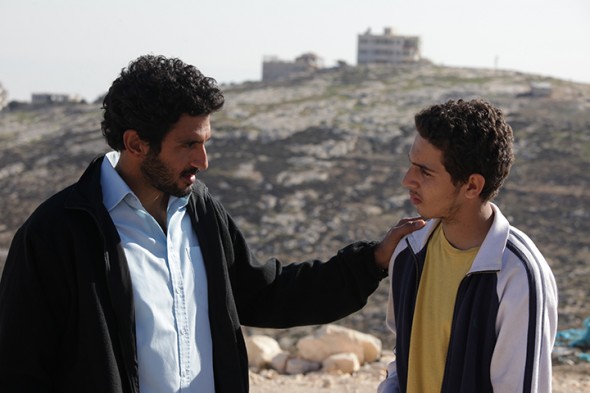
Thriller conventions and personal relationships across divided lines are explored in Bethlehem, the first feature film from Israeli director Yuval Adler.
The title of the film is more loaded with meaning and significance than the simple name of a town, and although religion is not directly mentioned as a source of the conflicts depicted, the convictions of the characters are acted on with religious fervor. Adler’s personal experiences in Israeli Intelligence, as well as his time spent working in New York City, afford him the opportunity to view complex realities of the embattled Holy Land from multiple perspectives. Add to those experiences his collaboration with Palestinian writer Ali Wakad, who co-penned the script, and the result is an Israeli film set in a sensitive region that attempts to cast both sides of a conflict in shades of grey.
The center of the story is a teenaged Palestinian boy named Sanfur (Shadi Mar’i) who struggles, as most teenaged boys do, with his identity. He puts on airs as the tough kid in the neighborhood, challenging other boys to competitive shows of machismo. But perhaps not quite like all teenaged boys, his posturing includes firing off automatic weapons and being an informant to Israeli Intelligence while living under the shadow of his older brother Ibrahim, a leader in the Palestinian resistance. Razi (Tsahi Halevi) is the Israeli Intelligence officer who works closely with Sanfur. His paternal feelings for his informant come into direct opposition with his work when Sanfur’s brother becomes an Israeli target.
Bethlehem, like the internal and external conflicts it explores, can seem cacophonous as it shifts back and forth between its highly disparate points of view. The film moves from Razi and Sanfur and their own difficulties reconciling their loyalties and duties, to Razi’s fellow officers who see Sanfur as a mere means to an end, to Sanfur’s Palestinian friends and family, to members of the Al-Aqsa and Hamas and the conflict they have amongst themselves, despite similar goals. At times, the results can be disorienting, but the strength of the performances ultimately keeps Bethlehem from falling apart. Halevi and Mar’i deliver complex characters who beckon the audience to follow them into difficult territories.
Adler and Wakad’s script attempts to tell the stories from a character level in order to keep the underlying politics and ethnic disputes in the background, but it is probably impossible to tell these stories without real politics slipping through. There have been some writings from both sides accusing Bethlehem of being propaganda, and one can’t help but to wonder if that is a failing of the filmmakers or of the audience’s tendency to interpret the film according to its ready-made assumptions.
Whatever the true intentions, it is clear that Adler chose the thriller genre as the medium to tell this story in order to try and appeal to a larger audience. Technically speaking, it is probably here where Bethlehem most acutely misses the mark. The characters are fully realized and relatable, but the tension and pacing that should keep the audience enthralled in the action are too often lackluster. For a first attempt, however, Adler delivers an impressive film overall. Interestingly, its release coincides with the film Omar, which is also about a Palestinian informant, but directed by a Palestinian director. Bethlehem and Omar are very different films in a lot of ways, but they would make quite an interesting double feature.
Bethlehem opens in San Diego on Friday, March 7 at Landmark La Jolla Village Cinemas.